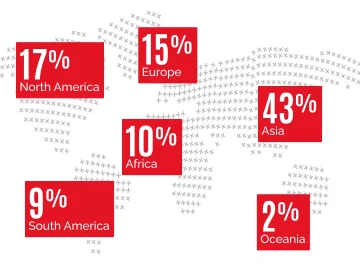The target was to streamline the financial reconciliation process.
A workforce management company teamed up with CoinsPaid to introduce real-time exchange rate tracking and automated chargeback reconciliation. With rising transaction volumes, the company needed a faster, more accurate way to manage financial reporting.
Crypto Wallet is your easiest way to get into crypto
Cryptocurrency transactions are processed instantly and available 24/7, so you won’t have to comply with restrictive banking hours.
Our wallet allows companies almost all over the globe to accept crypto payments legally and almost instantly.
Merchants are able to lower processing costs and improve the check-out experience for their business.

Business Wallet vs Other Solutions
| Our Business Wallet | Regular Crypto Wallet | Fiat | |
|---|---|---|---|
| Legality | Legal | Grey | Legal |
| Security | High | Low | Varies |
| Transparency | High | Low | Varies |
| Accessibility | High | High | Low |
| Fees | Low | Low | High |
| Transaction speed | Fast | Fast | Low |
| Currency exchange | High | Limited | Limited |
| Business use cases | High | Low | Medium |
POWER YOUR
BUSINESS
WITH CRYPTO
Hundreds of merchants choose our payment solution
You don’t have to own crypto to accept it for your business — CoinsPaid will instantly convert obtained funds into fiat.
- No volatility risks
- Withdrawals via SEPA and SWIFT
Connecting Business Wallet won’t cost you a dime —we don’t have any set-up or monthly fees.
No API integration is required, allowing you to accept digital asset payments immediately once we sign the contract.
FULL -
FLEDGED
ECOSYSTEM
FOR
BUSINESSES
CoinsPaid is a licensed crypto payment processor, with integrated KYB procedure, and its own compliance department with AML officers & MLRO.
CoinsPaid is a solid private company with regular financial and regulatory audits.
We never use customers’ money for any reason, and our merchants are able to access their funds at any time.
2 blockchain risk scoring systems to detect suspicious transactions
Diversified treasury management with Ledger Enterprise cold storage solution
Regular third-party security audits with zero vulnerabilities detected

crypto
owners
1 in 13 people in the world has digital assets, crypto is swiftly getting embraced by companies and institutions alike.
In 2025, the number of crypto owners surpassed 650 million worldwide — analysts predict it’ll surpass 1 billion within 5 years. The market is expanding and it’s a powerful opportunity for businesses to access a young, tech-savvy audience of people with crypto.

Removing Limits and Reducing Costs
| Cryptocurrency | Visa / Mastercard | Other methods | |
|---|---|---|---|
| Transaction Fee | Below 1% | From 3% | From 2% |
| Chargebacks | No | Yes | No |
| Rolling reserve | No | Yes | Yes/No |
| Success rate | 99.9% | 70-95% | 60% |
| For businesses with large volumes, we can also provide personal discounts. |
Customer success stories
How to open a Crypto Wallet?
-
You leave a request on our website.
Within 5 minutes, our manager contacts you via email to set up a meeting.
-
The manager shows you how the system works and answers all your questions.
Based on your business model and payment needs, we prepare a personalised offer.
-
You provide the necessary KYB documents to sign the agreement.
A personal manager guides you through the integration process.
-
You start accepting crypto payments from your customers.
We support 20+ top cryptocurrencies
Crypto — universal payment tool for businesses

By accepting crypto, real estate agencies avoid numerous limitations of traditional banking systems:
- Payments are available 24/7.
- No more amount limits or chargebacks.
- Transactions are processed almost instantly.
- It’s cheaper and faster than SEPA or SWIFT.

Crypto users are an untapped resource for luxury businesses:
- 83% of millennial millionaires own crypto and plan on increasing their investments.
- 53% of them hold 50% or more of their total assets in cryptocurrencies.
Cryptocurrency allows to settle a payment for any luxurious item in a matter of seconds, providing your customers more flexibility and freedom.

Swiftness is what matters the most for a busy flyer looking to book a flight urgently.
No hours of waiting for a bank transfer approval — we are able to process payments in 20+ top cryptocurrencies almost instantly with up to 80% lower cost.

Marketing agencies often use our business crypto wallet as a convenient way of settlement with contractors around the globe:
- Complete accounting transparency.
- Documentation records for each payment.
Crypto Wallet for Business: FAQ
CoinsPaid crypto wallet is an advanced solution for business. With a business crypto wallet, entrepreneurs can seamlessly accept crypto payments. No technical skills or blockchain knowledge is required. With CoinsPaid corporate crypto wallet, you can accept crypto payments and securely store digital assets, simultaneously enjoying low fees and user-friendly online wallet experience.
- No API Integration: CoinsPaid does not require complex API integrations in comparison to other corporate crypto wallets;
- Intuitive Interface: The wallet’s intuitive design ensures a seamless user experience. The business crypto wallet features easy navigation and clear functionalities. Thus, managing cryptocurrency assets is convenient;
- Ideal for Low-Frequency Payments: Our crypto wallet works best for businesses that handle transactions manually. Following this approach, you maintain full control over your payments, whatever the use case and industry.
Absolutely! A crypto wallet for business is an excellent tool for enterprises of any size. It makes crypto accessible for business transactions. With a corporate crypto wallet like CoinsPaid, entrepreneurs can reach a larger customer base and offer more flexibility in payment. As an added bonus, the CoinsPaid corporate crypto wallet does not require an API integration.
Our crypto wallet for business features 20 top cryptocurrencies: Bitcoin, Ethereum, Tether, etc. The wallet also offers 40 fiat currencies: USD, EUR, GBP, JPY, etc. The full list of supported currencies is here.
- To set up a crypto wallet for business, you submit a request on our website. Within 5 minutes, our manager will reach out to schedule a meeting.
- During the meeting, the personal manager will show you how the crypto wallet for business works and answer your questions.
- If you decide to purchase the business crypto wallet, our team will customize the product according to your business model and its payment goals.
- To sign the agreement and launch the platform, we conduct a KYB check. If successful, your business will start receiving cryptocurrency payments.
Yes, it does. Automatic withdrawals provide flexibility and convenience in cryptocurrency management. By enabling automatic withdrawals, you can streamline financial processes and ensure a seamless flow of funds for business operations
Your business crypto wallet can accept crypto. If you do not want to hold virtual assets, you can obtain them to convert crypto to fiat. In this scenario, you eliminate volatility and manage your finances with greater stability and certainty. We also support fiat bank transfers for withdrawals and deposits. This integrated fiat support makes our crypto wallet the best solution for businesses that prefer to work with traditional financial systems while still benefiting from cryptocurrencies.
Yes, you can! With CoinsPaid business crypto wallet, you can keep an eye on all your cryptocurrency transactions. Such control is essential for efficient business account management and financial reporting.
CoinsPaid corporate crypto wallets offer a 24/7 support system. The support team assists users in navigating the platform and resolving issues. Our specialists aim to provide the best possible user experience.
Choosing the best business crypto wallet focus on the requirements of your enterprise and its objectives. CoinsPaid business crypto wallet combines security and convenience. It has multicurrency support, enhanced security measures, seamless integration with existing systems, advanced reporting tools.

